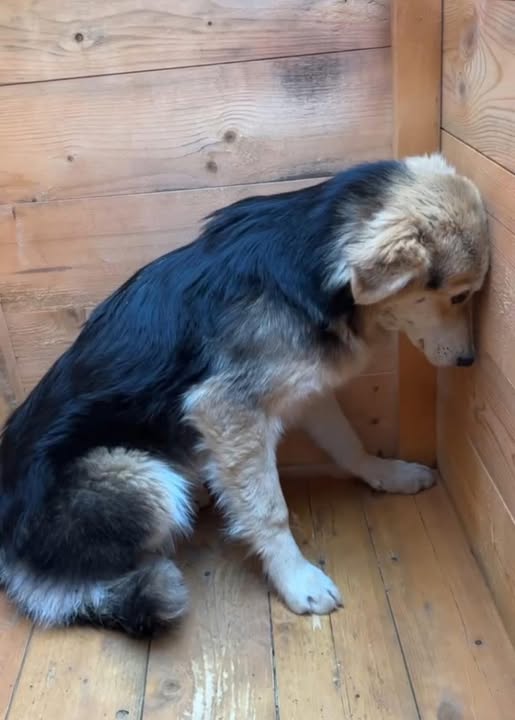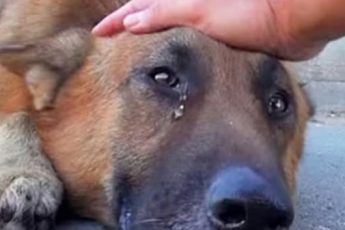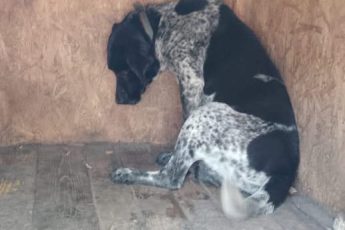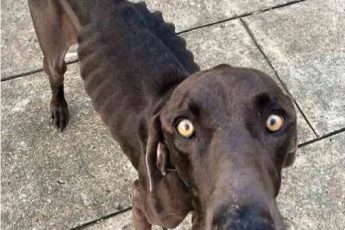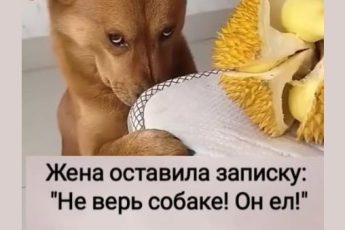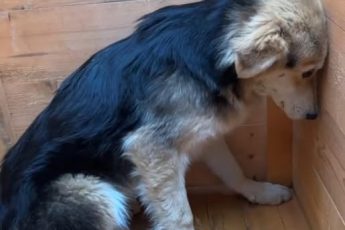When he ended up at the shelter, no one could quite figure out what was wrong with him.
He didn’t growl, didn’t bare his teeth, didn’t show aggression. But it was hard to call him alive, either.
It seemed like he had disappeared from the inside out — only a shell remained. A body moving out of inertia, and inside — emptiness.
He didn’t resist, didn’t look around when they brought him in. He just walked into the wooden kennel — on his own, without a leash, without struggle — and chose a corner.
He stood there, turned away from everyone, and froze. Not out of fear. Out of resignation.
This was not how cowards behaved — this was how those who had already given up behaved.
On the first day, he just stood there, unmoving, like a statue.
On the second day, he sat down, tucking his tail slightly.
On the third, he lay down, pressing his muzzle against the boards.
He didn’t sleep, didn’t eat, didn’t make a sound. He just breathed. Shallowly, as if it was hard.
The shelter workers decided he might be sick.
— “Is he okay?”
— “I don’t know. This behavior is strange. Maybe internal injuries?”
They called the vet. The examination was quick — the dog didn’t resist, didn’t even react to the cold stethoscope.
— “He’s completely healthy physically,” the vet said, taking off his gloves. “But he’s broken. Psychologically. This happens when a dog loses something… or someone… very important.”
At first, they decided to give him space.
But a week passed, and he was still lying in the same corner, staring at the wall.
Volunteers began to worry. They tried to coax him out — with gentle words, toys, food. It was useless.
He would simply crawl back and press his head against the wood, as if he wanted to disappear into it.
— “Look into his eyes,” one of the girls whispered. “That’s not just sadness. That’s the look of someone who’s been forgotten.”
Time passed. The kennel was cleaned, his food changed, people and dogs passed by. All of it — passed him by.
They tried calling to him. They tried different names. Shadow, Little One, Corner. He didn’t respond to any of them.
Sometimes he blinked. Sometimes he would take a deeper breath. But mostly — emptiness.
He didn’t even shiver from the cold. As if it didn’t matter to him.
Then one morning, when the shelter was still quiet, one of the volunteers noticed something strange.
Outside, someone called out:
— “Fly, come here!”
And at that moment, the dog flinched. For the first time during all this time.
He didn’t get up, but his ears twitched. His gaze shifted, just a little. They noticed.
— “Did you see that? He reacted! He recognized someone!”
The next day they took photos of him. A few shots — profile, front, a close-up of his empty eyes. They posted the photos in “Lost Pets” groups.
A little more than a day passed when a man called. His voice was trembling:
— “Do you… by any chance have a dog with a white chest and a dark face? He has a spot shaped like an arrow on his back leg.”
— “Sounds like him. And you are…?”
— “We were a family. We had him since he was a puppy. Then we moved. I got divorced. Everything happened so fast. He got scared of the moving truck and ran away. I looked for him for months.”
— “Come over,” they replied. “Let’s try.”
He arrived early in the morning. The shelter was still cleaning the kennels. The man didn’t walk in immediately. He stopped in the walkway and called out:
— “Tariq?.. Tariusha?..”
At first — silence.
Then — movement.
The dog who hadn’t moved in weeks suddenly lifted his head. Sat up. Then stood up.
He didn’t bark, didn’t fuss, didn’t jump. He simply stood up and walked. Slowly. Steadily.
He came up to the man and pressed his forehead into the man’s palm. Firmly. Quietly. Exactly.
— “Forgive me…” the man whispered. “I didn’t abandon you. I just couldn’t find you.”
The dog didn’t wag his tail. He just stood there, pressing his body close. One moment, then another.
The man knelt down and hugged him. And for the first time in all this time, the dog’s eyes blinked like those of someone alive again. Like someone who could believe again.
Now Tariq lives in a quiet house outside the city.
He still doesn’t play with a ball. He doesn’t chase cats. He doesn’t get excited by loud voices.
But every morning, he comes up to the window and looks out into the garden. Then he goes to his owner and rests his muzzle on his knees.
He chose a corner when he had lost everything.
And now he chooses a person again.
And it seems, for the first time, he does it not out of fear, but out of love.
